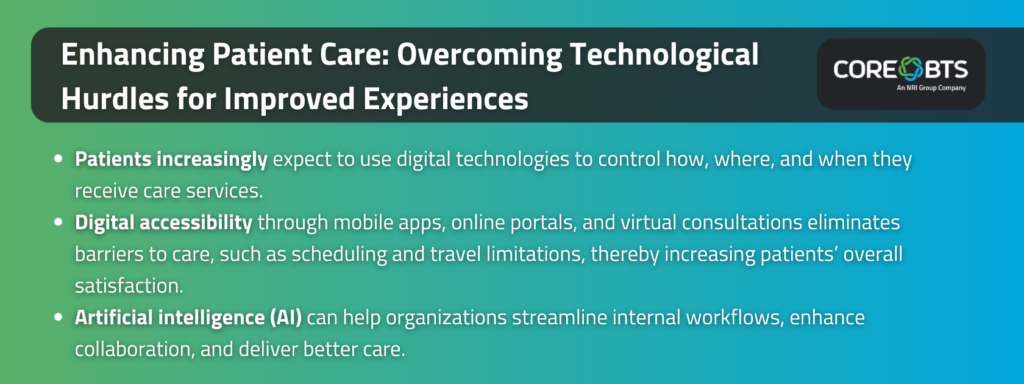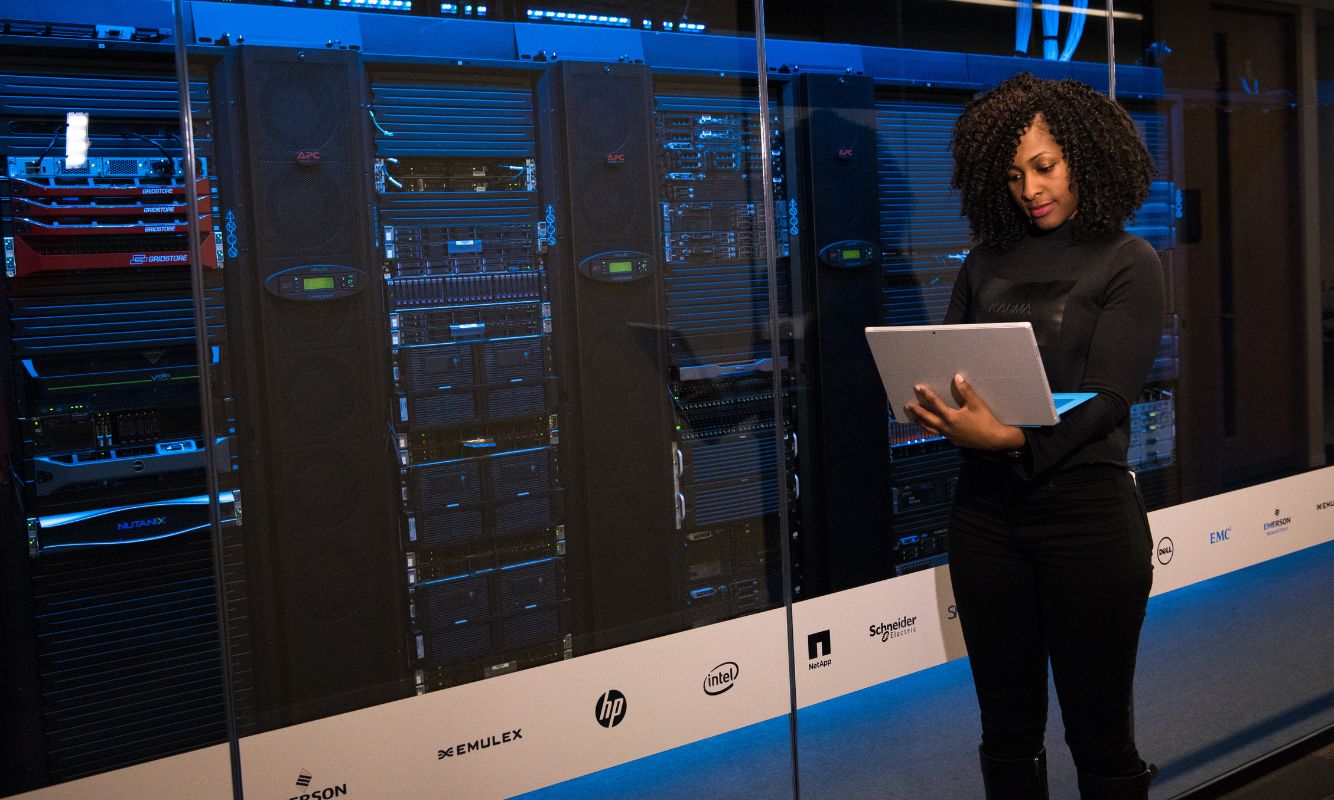As technology disrupts the healthcare sector, organizations must leverage it to deliver better care and meet patient expectations.

While healthcare is a hands-on field, technological advancements are transforming how caregivers deliver services—and how patients receive them. Technology solutions have proven to improve patient outcomes, increase patient volume, save money and time, and boost revenue. Perhaps the most critical factor driving technology adoption in healthcare today is that patients expect it. Increasingly, healthcare providers must harness digital technologies, giving patients more control of their care.
Patient Expectations in 2024
Decades into the digital age, patients have deep experience with technology innovations and service models that organizations in other industries use to deliver cost-effective, consistent, and targeted service. As a result, they expect to have a similar experience in healthcare, even though healthcare delivery carries significantly higher personal stakes and is vastly more complicated.
As patients proactively manage their health, they demand consistent, streamlined, integrated, and ultra-personalized experiences. For example, they expect responsive solutions to schedule appointments, make payments, fill out forms, access health records, and communicate with nurses and physicians.
At the same time, patients demand better protection of their personal health information (PHI). Rising telehealth adoption has increased awareness of the value of health data—and the need for its appropriate and secure use.
Increasing cyber incidents also provide patients with a reason to be more cautious about sharing data with healthcare providers. In March 2024, the Department of Health and Human Services (HHS) Office for Civil Rights (OCR) recorded 93 breaches of 500 or more records (41% year-over-year increase), affecting 2,971,249 individuals.
A suboptimal tech stack and configuration are ill-equipped to meet the demands of modern, digital-first patients. Healthcare providers with outdated technology and practices risk fragmented patient care journeys, extended wait times, medication errors, security incidents, and other outcomes that hurt the bottom line. So, it’s essential to adopt the best-in-class technologies right away.
Integrating Advanced Technology for Better Patient Care
Today, digital solutions—mobile apps, online portals, telemedicine—help providers and patients maintain contact and share information consistently and promptly.
Electronic health records (EHRs) provide a shared reference, allowing healthcare personnel to access the same resources, procedures, medications, and flow of interactions as patients. This expedites service delivery by eliminating duplicate steps such as conducting medication reviews.
Similarly, robust clinical decision support (CDS) tools streamline workflows and reduce variability of care as healthcare personnel no longer need to consult multiple resources to develop a treatment plan or make an accurate diagnosis.
These solutions ensure alignment across the patient care journey by providing a single source of patient information. At the same time, they alleviate administrative burden and burnout on staff, freeing them to focus on delivering outstanding patient care.
However, healthcare providers must integrate artificial intelligence (AI) to maximize the benefits of existing solutions. For example, AI can support digital communications, offering tailored treatment options, scheduling reminders, and suggesting next steps to patients. At the same time, it can improve diagnosis accuracy and speed, helping healthcare providers deliver faster, more personalized care to more patients daily.
AI and automation can minimize paperwork, data entry, and other administrative tasks. For example, generative AI can help caregivers take notes, summarize content, and keep thorough medical records. At the same time, it can improve knowledge sharing between departments, contributing to seamless collaboration and more efficient operations.
As organizations leverage AI for better healthcare, they must ensure their systems are intuitive and user-friendly for both caregivers and patients. They must also implement system-wide precautions to prevent unwanted security intrusions and disruptions. At the same time, they must adequately train staff to empower them with the skills to operate new systems and technologies efficiently. All this must be done while keeping costs in check.
Improve Patient Experiences With Core BTS
With patient expectations growing, healthcare providers must evolve capabilities to keep up. This means shifting from suboptimal tech stacks and configurations to advanced ones that improve operational efficiency, security, and patient service delivery. Balancing cost management with the adoption of new technologies and practices is paramount. Similarly, organizations must provide adequate staff training to maximize the benefits of new systems and technologies.
All this can be overwhelming. But with a reliable partner like Core BTS, it doesn’t have to be. Core BTS helps leading healthcare providers harness today’s most powerful technologies to facilitate superior patient care, system security, employee productivity, and more.
Case in point: Frederick Health. When the Healthcare leader wanted to deliver better, faster, and more secure patient experiences, they turned to Core BTS. Our team started with extensive discovery and design discussions with Frederick Health to understand their pain paints and how we could help evolve their capabilities. From there, we developed a strategy for building a scalable, secure, and collaborative platform. Solutions included the following:
- Integrating Nortel and Cisco Voice Systems to Streamline the Call Center Environment.
- Implementing robust Cisco security solutions for email, network visibility, multi-factor authentication, DNS, and state-of-the-art firewalls.
- Securing 250 free Webex licenses to enable telemedicine and facilitate seamless communication with patients.
- Engineering outside wireless connectivity for more efficient patient registration and testing.
These improvements helped Frederick Healthcare increase customer service agents from 65 to 135, reduce call abandonment rate to below 2%, cut call waiting times to less than a minute, and prevent unwanted security intrusions and disruptions. Additionally, they led to greater caregiver productivity, better patient experiences, and reduced support and maintenance costs.
Read the full case study of how Core BTS helped Frederick Health realize its vision of providing world-class healthcare.





Share on